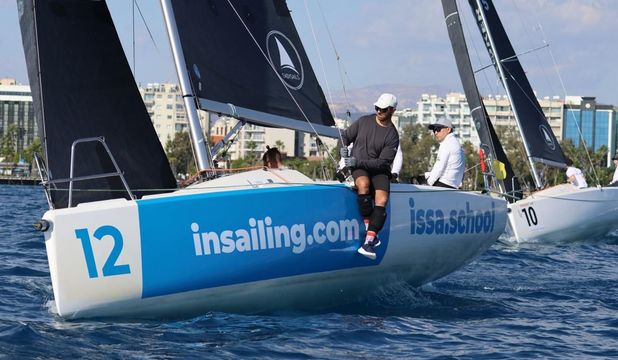Rolex Fastnet Race 2021
Duration
Team level
Activity level
Event Language

About event
Start:The Solent, United Kingdom
Finish:Cherbourg-en-Cotentin, France
Rolex Fastnet Race 2021
Founded in 1925, the Rolex Fastnet Race is a biennial offshore yacht race organised by the Royal Ocean Racing Club of the United Kingdom with the assistance of the Royal Yacht Squadron in Cowes and the city of Cherbourg-en-Cotentin in France.
The race is named after the Fastnet Rock, which the race course rounds. The race is considered one of the classic big offshore races, the 'Fastnet' is testing both inshore and offshore skills, boat and crew preparation and speed potential. From its inception, the Fastnet Race has proven highly influential in the growth of offshore racing, and remains closely linked to advances in yacht design, sailing technique and safety equipment.
The Fastnet Race has been sponsored by the Swiss watch manufacturing company Rolex since 2001.
The race's main focus is on monohull handicap racing which presently is conducted under the Royal Ocean Racing Club's own IRC Rating Rule and it is this that is awarded the overall trophy, the Fastnet Challenge Cup. However the race has more recently opened itself up allowing multihulls and providing one design class starts for classes such as IMOCA and Class40.




Events schedule
- Aug 8, 2021
The race starts off the Royal Yacht Squadron start line of Cowes on the Isle of Wight on the south coast of England at the Royal Yacht Squadron. Leaving The Solent through The Needles Channel, the race follows the southern coastline of England westward down the English Channel, before rounding Land's End. After crossing the Celtic Sea, the race rounds the Fastnet Rock off the southwest coast of Ireland. Returning on a largely reciprocal course, the race rounds the Isles of Scilly before finishing at Cherbourg.

Location
Great Britain
Discussion
FAQ
Can I participate in a regatta if I don’t have yachting experience?
Yes, of course. There will be an experienced skipper and team members on the yacht. They will give you a role and teach you everything you need to know to be a useful team member and feel comfortable.
Will I be able to steer a yacht?
Yes, all team members will definitely try themselves in different roles to better understand each other. Standing at the helm is an integral part of training for beginners as well as setting sails, and helping the team during moorings.
Where will I live during the regatta?
As a rule, participants in the regatta live on the yacht. The boat has everything you need for a comfortable stay: nice beds, a kitchen, a shower with toilet. If you do not want to live on a yacht, then you can arrange to stay at the hotel onshore.
What will we eat?
The crew decides altogether what kind of food they prefer to eat and makes necessary purchases. Simple dishes can be cooked, usually taking turns. Some regattas offer daily meals and intensive evening program for all crews.
Do you help with a visa?
We can make an invitation for a visa, but you need to apply for a visa by yourself.
Will I have seasick? What should I do if I have sickness?
Most people tolerate some seasickness easily. If you feel that you are starting to feel sick, it is best to get at the steering wheel or tune the sails. Get yourself busy, show your body that you don’t have time to get sick, you have to fight for victory in the race. There are also many quite effective medicines from sickness. If you start taking them in advance, then the probability of seasickness is almost zero.
How and where will I meet the crew and the captain?
Before each trip, we organize an online meeting where participants get to know each other and the captain. The captain will answer all your questions. The crew will have a group chat so you can get to know each other before the start of the regatta. Then you will meet in the marina.
What clothes do I need?
The main rule is to dress comfortably and according to the weather. Clothing: • windbreaker and pants or shorts; • shirt/jacket with UV protection (thermal underwear and fleece); • adjustable hat/cap; • gloves. We recommend to purchase a long-sleeved jacket with UV protection in order to protect yourself from the sun and strong wind. Yachting shoes should be: • light, with non-slip white outsole; • with the fixed heel; • with a tightly closed nose. During the sailing without shoes, you can fall or injure your fingers and feet on the deck. There are many protruding parts on the boat that are easy to catch. Unfortunately, even experienced sailors are not protected from unpleasant injuries when they ignore this simple rule.








No comments, be the first one!